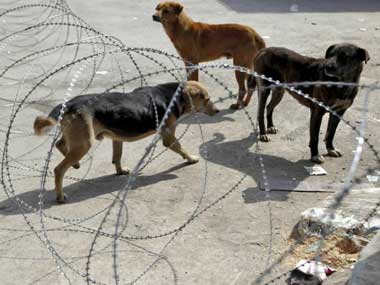That dogs are man’s best friend is known.
Now, the highest court in the land has upheld a Delhi High Court order giving our stray four-legged stray friends the right to food and water and granting citizens the right to feed them.
The apex court, on 4 March had stayed the high court’s verdict on a plea of NGO ‘Humane Foundation for People and Animals’ that the directions may lead to an increase in stray dog menace.
A bench comprising Justices Uday Umesh Lalit, S Ravindra Bhat, and Sudhanshu Dhulia took note of the submissions that the high court’s verdict was delivered in a civil lawsuit involving two private parties and the NGO has no locus to intervene in the subsequent proceedings.
What did the Delhi High Court say?
The high court, passing its order in a case of dispute between two residents of a locality on the issue of feeding stray dogs, had asked that care and caution be taken to not impinge upon others and no harassment or nuisance is caused.
One of them had sought direction to restrain the other from feeding street dogs near the entrance of a property. Later, a settlement took place between the two and a designated place was fixed for feeding the canines.
The high court laid down the following guidelines:
- Every dog is a territorial being
- It has to be fed and tended to at places within its territory that are not frequented by the general public
- Any person having compassion for stray dogs can feed them at their private entrance or driveway of their house or any other place not shared with other residents
- The verdict also discussed dog categories based on the roles they play service, therapy, rescue, hunting, tracking, cadaver, detection, police, and cancer detection dogs.
What does this mean? In simple terms: no one can restrict another from feeding dogs, until and unless it is causing harm or harassment to them
What happens in case of dispute?
As per Indian Express, the high court put the burden on law enforcement agencies to ensure that there is no hindrance caused to any person in carrying out activities related to street dogs at the permitted spots.
Also, it is the duty of the local SHO to “ensure peace and harmony among residents of the area”, the court said.
The court also said that every RWA should have an Animal Welfare Committee to ensure compliance with provisions of the Prevention of Cruelty to Animals Act, and to maintain harmony between feeders and other residents. In case of a grievance, the residents must approach the committee first, the court said, as per the newspaper. Complex issue
The issue of stray dogs in India is both emotive and complex with animal lovers and those who fear for their safety on either side. Newspapers across the country are filled with stories about disputes in co-operative housing societies and strangers coming to blows in public.
In March 2022, Bangalore Mirror reported that two women had approached the police complaining of being attacked by a neighbour for feeding stray dogs.
In Mumbai, a woman in December 2021 claimed her housing society had fined her Rs 8 lakh for feeding strays inside her housing complex, PTI reported.
Anshu Singh said that the housing society imposes ₹ 5,000 per day fine on those found feeding the stray dogs inside the complex. “It is imposed as littering charges. My cumulative fine amount till now is over ₹ 8 lakh.”
The society’s managing committee took a decision to fine those found feeding the canines inside the premises. This practice started in July 2021, she said, adding that a number of stray dogs are found roaming inside the complex.
The cumulative fine amount imposed on another resident is Rs 6 lakh, she added.
Another resident, Leela Varma, said that the society watchmen follow those members who are feeding the dogs and note down their names. It is then reported to the managing committee, which in turn calculates the fine.
In Pune, police in November 2021 arrested four men for molesting a woman who was feeding strays, as per a report in The Times of India. The men first objected to the women feeding strays, then hurled abuse at her and molested her. They also beat up her driver.
While such stories are legion, the statistics can be eye-opening.
As per BBC, Mumbai civic authorities in March 2016 told the Supreme Court dog bites in the city killed more people in 20 years than the 1993 serial blasts and the 26/11 attack in 2008 combined. Authorities said 434 people succumbed to rabies between 1994 and 2015, while the toll in the two attacks was 422.
The petition also stated that more than 1.3 million people were bitten by dogs during the same period, as per the report.
Animal rights activists, for their part, decry such comparisons as hyperbole.
Andrew Rowan, president of Humane Society International (HSI), told BBC: “There are many more free-roaming dogs in Latin America than there are in India. In some communities in Latin America, there are as many as 50 dogs per 100 humans. The highest rate of free-roaming dogs we have recorded in India is around 7-8 dogs per 100 humans. By those standards, I would say that the dog problem in India is way lower than other parts of the world."
With inputs from PTI
Read all the Latest News , Trending News , Cricket News , Bollywood News , India News and Entertainment News here. Follow us on Facebook , Twitter and Instagram .


)




)
)
)
)
)
)